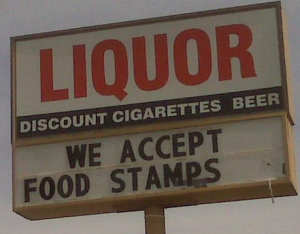Welfare Fraud Still Plagues California
by CalWatchdog Staff | July 5, 2011 11:06 am
 [1]JULY 5, 2011
[1]JULY 5, 2011
By ALI MEYER
Vacations subsidized by fraud. Welfare to those not meeting work demands. Welfare cards used to buy coffin nails and fire water.
After such outrages, one might think the California Department of Social Services would reform itself. Especially at a time when the state can’t pay its own bills. Nope.
California is the leading welfare provider in the United States. It pays for the largest number of welfare fraud cases — with little sign of reversal. This wide-ranging fraud includes extracting welfare money from casinos and cruise ships, the failure of welfare recipients to meet work requirements, and filing false returns. What a mess.
Reported the Orange County Register[2], “California is nearly twice as big as New York state, but we have five times as many welfare cases. According to the Public Policy Institute of California, our state is one of the only nine that does not enforce the federal government’s five year lifetime limit on cash welfare assistance. The monthly cash check is almost 70 percent higher than the national average.”
The prevalence of welfare fraud is disheartening. Last year the Los Angeles Times broke the news[3] that millions of dollars were withdrawn from welfare cards at destination hot spots across the country. Jack Dolan wrote, “More than $69 million meant to help the needy pay their rent and clothe their children was accessed in 49 other states, the U.S. Virgin Islands and Guam between January 2007 and May 2010, according to data from the California Department of Social Services.” More than $11 million was blown in Las Vegas. No one knows if Elvis got some of that.
And another $16,010 was withdrawn from cruise ships to Long Beach, Rio de Janiero and Beijing. Let’s hope the buffets were worth it.
In response, Gov. Schwarzenegger ordered the deactivation of ATMs for welfare cards across the country at gambling venues and cruise ships. But it was a minor reform.
Shirking Work
Besides the gross misuse of welfare benefits, recipients are not meeting their expected work requirements. Out of a sample of 310 welfare cases, only five individuals participated in activities that moved their family toward self-sufficiency, according to a California Department of Social Services’s study in March 2011. Only 60 of the 310 cases participated in countable work activities.
While many welfare recipients are failing to pull their own weight, California Department of Public Social Services workers aren’t much better. One worker, Trang Van Dinh[4], was found filing nearly 200 fraudulent tax returns, preying on those who were seeking help. He used clients’ personal information to file false tax returns in 2009 and 2010.
After victims found their tax returns delayed, only then was attention brought to the case. He pleaded guilty in February to two felony counts, which earned him 46 months in jail and $667,000 in restitution.
So what steps is California Department of Social Services taking to reverse the fraud? On July 1, 2010, the CDSS provided a response to Schwarzenegger’s Executive Order S-09-10[5], in which they listed 10 proposals, including plans for early fraud prevention and funding. Proposal six of the plan states that CDSS would dedicate funding to be used for anti-fraud activities to implement an Early Fraud Program. The program would allow county Special Investigation Units aiding in detecting withheld information.
Proposal eight would create a fraud investigative resource program within the existing Fraud Bureau, which would serve as the foundation for business intelligence needs on fraud prevention and investigations.
Proposal nine would enhance, expand and automate the Income Eligibility and Verification System, which would verify the accuracy of a clients identity and citizenship status and identify false social security information.
Proposal ten would implement a welfare fraud analytics system that would provide information that would help identify fraud in these benefit programs.
Investigations Decrease
With all of these initiatives to improve intelligence, common sense would suggest that more fraud investigations would be taking place. Instead, the number of investigations has actually decreased. In July 2010, when the proposals were written, 6,092 investigation requests were accepted for the Food Stamp program.
By January 2011, the investigation requests went down to 5,437. The number of pending investigations for CalWorks and Food Stamps were 117,745 in July 2010. Six months later, 23,103 more cases were pending at the end of the month.
Rather than increase the number of welfare fraud investigations, it appears as if the Department of Social Services has failed to use new fraud detection measures and ensure that the taxpayers’ dollars are not going to waste.
A final outrage is that welfare recipients are allowed to use their Electronic Benefits Transfer (EBT) cards to buy booze and smokes. Senate Republican Leader Bob Dutton of Rancho Cucamonga proposed SB 417. It would have banned using the EBT cards to purchase alcohol and tobacco products. It didn’t pass.
“You would think a simple common sense reform like trying to make sure taxpayer money is not used for the purchase of alcohol and tobacco would find bi-partisan support,” Dutton said. “There definitely need to be reforms in this area. Thirty-three percent of the budget is spent on health and human services.
“If we can’t stop welfare recipients from buying cigarettes and alcohol, we have a problem,” said David Wolfe the Legislative Director at the Howard Jarvis Taxpayers Association.
Of course, there is a way for welfare recipients to buy cigarettes and whisky: get jobs and pay for it themselves. But for now, the Democratic majority in the Legislature favors letting taxpayers pick up the party tab.
- [Image]: http://www.calwatchdog.com/wp-content/uploads/2011/07/Food-stamps-Liquor.png
- Orange County Register: http://articles.ocregister.com/2010-01-29/opinion/24647055_1_welfare-cases-welfare-recipients-welfare-reform
- news: http://articles.latimes.com/2010/oct/04/local/la-me-welfare-20101004
- Trang Van Dinh: http://articles.latimes.com/2011/jun/28/business/la-fi-id-theft-20110628
- Executive Order S-09-10: http://www.cdss.ca.gov/cdssweb/entres/pdf/Fraud_Prevention_Plan.pdf
Source URL: https://calwatchdog.com/2011/07/05/welfare-fraud-still-plagues-california/